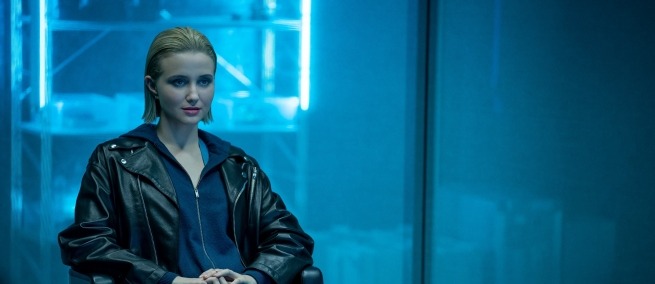
THE GIRLFRIEND EXPERIENCE, an anthology series reimagining the Steven Soderbergh film of the same name, is now in its third season which explores how technology might change the nature of transactional relationships. Julia Goldani Telles (THE AFFAIR) stars as Iris, a new hire at a tech startup using neuroscience to develop artificial intelligence (AI) that can believably interact with and predict the behavior of humans. As a side job, Iris works for a high-end escort service that she uses as another means of data collection to feed back into the AI she’s at work developing. Director Anja Marquardt (SHE’S LOST CONTROL), who created, wrote, and directed the season, worked with Oxford University research mathematician Simon Stringer on the depiction of AI. We spoke with both of them about working together on the show’s ideas, its development, and conscious machines.
Science & Film: Anja, why did you reach out to Simon to help on THE GIRLFRIEND EXPERIENCE?
Anja Marquardt: My hope was that we could show the series to someone working in the field who has a scientific mind and for them to feel like we’ve done what we could to represent their work in a balanced way. Finding Simon was a bit like finding a needle in a haystack for two reasons. One, his work is at the cutting edge of artificial intelligence and neuroscience which, believe it or not, is not that common. The few people we were able to find who do work in that field were often not allowed to talk to us because they were contracted by Google Brain or some other private venture that had them under an NDA. The other reason was that I wanted to find a consultant who also had a spark for storytelling.
S&F: Simon, have you ever consulted for a film or series before? What was your reaction when Anja approached you?
Simon Stringer: No, and it was fantastic to work with Anja. Let me just say, she did more than just justice to our discipline. The ideas are fabulous. For example, the of using generative adversarial networks to see if [AI] could learn to replicate intelligent speech: no one’s ever done that. I find that prospect absolutely intriguing. If you could design a machine learning system and expose it to enough language, could it learn to simulate intelligence? Today, people use generative adversarial networks as speech synthesizers that sound realistic, but they’re not generating the words. That’s the next step. That’s what we’re trying to do where I lead a lab at Oxford to develop a computer simulation of the brain.
My degree was originally in engineering science, but I moved across to neuroscience because the brain can do so much that today’s machines cannot, and I wanted to understand that and understand the basis of consciousness itself. There is a lot of philosophical debate about whether machines can actually be conscious. I’m certain they can be, but not using the kinds of neural networks engineers are using today. The kinds [of neural networks] we’re developing at my lab are much more closely related to brain function and dynamics. They work very differently. If we’re going to create machine consciousness, that’s the route we need to go down—we need to pay much closer attention to the biology.
The story that Anja wrote is very much aligned with my own interests and I was intrigued by the ideas, really clever stuff. It was a wonderful experience. [In the field,] we’re moving towards machine consciousness not just intelligence, so Anja’s story is topical.

Still from THE GIRLFRIEND EXPERIENCE, Season 3
S&F: Anja, why were you interested in depicting a main character who is working in this field?
AM:. The work I do as a filmmaker is quite research driven and I enjoy the process of opening a window to worlds that are different from my own. I’m not a scientist, but I do enjoy the what if—piecing together information into a story.
What all the seasons of THE GIRLFRIEND EXPERIENCE have in common—even though it’s an anthology show so every season is its own animal—there is the element of transactional relationships that is being examined. It made sense for me to come to the table with my own point of view that included technology. Pretty much all transactions at this point in time have some component of data collection and aggregation built into them. So, exploring that and tying it into questions of artificial intelligence seemed like a really rich endeavor for the story world.
The world has changed so significantly since the franchise started several years ago. We’re all much more aware of the ideas of how to treat each other and be inclusive in the best of ways, and I do think machine learning is another frontier that we have to get right. Some of the concerns that have surfaced are quite serious when you think about racial bias in machine learning.
In terms of how Iris, the main character, came into my orbit: I had an idea about a protagonist who is so good at reading people that we look at her like a superhero. But then, ultimately, the artificial intelligence she is training becomes even better than her. How does that feel? What new rabbit hole does that open?
S&F: It’s interesting that in this season so far the relationship between Iris and the AI she’s working on is sort of the intimate one.
AM: Yeah, I’m trying to talk about exactly that without giving away too many spoilers. Thematically, the idea of one element feeding another and there being a feedback loop, that’s mirrored across the show in the way Iris interacts with her clients but also how she interacts with herself and the extension of herself that comes into existence, if you will.
S&F: Simon, you mentioned that these generative adversarial networks that the show depicts haven’t been used yet in that way. If you were to situate this show in the future, when do you think it would be and why?
SS: Something I really loved about the script was that the AI was sort of getting the upper hand on the character, because it was learning how to manipulate her. It’s quite unpredictable when you have this complex system. In terms of when it might happen, I think it’s a little way off. The way people used to think about AI is programming high-level AI, and I think we realize now it has to be an emergent phenomenon from the low-level biology. The way my lab is approaching it is to build basic systems to get the core principles of consciousness then scale up. In the long term, we might replicate something like in THE GIRLFRIEND EXPERIENCE, but I believe it’s about [the series is about] the ideas and you don’t have to hold slavishly to what’s actually happening, it’s much more fun to be imaginative.
S&F: Are you a film fan in general?
SS: I think film provides a superb mirror to the human condition. One of the all-time classic films BLADERUNNER makes you start thinking about yourself and what the value is of human beings. With conscious machines, one issue is how do we treat them, because they’re conscious. Anything conscious is protected under law, certainly in the UK—not because it’s alive but because it’s conscious. So how will we treat a generation of conscious machines? Beyond that, how is it going to change the way we feel about ourselves? The Ancient Greeks interpreted consciousness as the soul and that’s where they got their spiritual sense of self-worth. These are the sorts of issues being raised by THE GIRLFRIEND EXPERIENCE.
AM: I think certain works like BLACK MIRROR, EX MACHINA, and HER have started a global conversation about these topics and season three of THE GIRLFRIEND EXPERIENCE brings together all those questions in the realm of transactional relationships. It’s going to be interesting how people perceive it. The algorithm-supported dating industry is a billion-dollar industry. Apps like OnlyFans pretty much open the field to everyone to monetize themselves in whichever way they please. I personally think that what we’re seeing is that AI is getting better at seeming like it could be imperfect. Once the simulation of imperfection gets really good, we’re not necessarily going to be able to know a machine from something that’s organic.
-min.jpg)
Julia Goldani Telles and Anja Marquardt
S&F: So in a way the machines are getting better at predicting us and we’re going to get worse at predicting the machines. Eventually there might be some crossroads where we’re on par.
AM: Exactly. It’s all deeply fascinating and I felt very lucky to have Simon by my side before going into production to make sure we were doing it right and for him to also break down some of the questions I had.
I have no doubt that we’re in for some big surprises down the line [in this field], but I also like to believe that if we’re presented with ten perfect matches that have been selected by the ultimate algorithm and we could hypothetically have healthy offspring with all these people, I think the human heart would still pick one over the other nine and I think the mystery and illusive nature of that isn’t something we can crack.
SS: Do you really think we have free will about who we fall in love with?
AM: I’d like to think there is a component of mystery—you can call it free will or something else. If you strip away all the other factors, I’d like to believe another component exists.
SS: Something more than the biology?
AM: Yes, I like that there’s something we can’t know.
SS: I’m not sure what it might be. But I’m afraid I’m a bit cynical on this point which is why I raised it.
♦
THE GIRLFRIEND EXPERIENCE season three, which made its world premiere at SXSW 2021, is now on Starz.
TOPICS